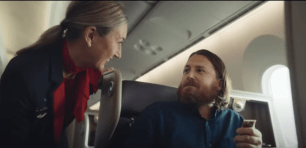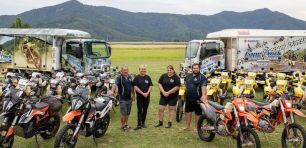
Camplify founder Justin Hales. Source: supplied.
Airbnb-for-campers business Camplify is enjoying a strong first reporting period since it listed on the ASX at the end of June. But, while strong numbers are clearly good for Camplify, they may also reflect a broader trend that’s bringing cash to small businesses in Australia’s regional towns.
Newcastle-based Camplify saw its gross transaction value grow by 170%, year-on-year, to hit $32.9 million.
That led to $8.4 million in revenue, representing a compound annual growth rate of 129%, compared to the 2019 financial year.
Total bookings were also up by 128%, year-on-year.
Speaking to SmartCompany, Camplify founder and chief Justin Hales says the strong results are a reflection of a broader trend of increased adoption of travel via campers and caravans, largely due to the lack of international travel options during COVID-19.
Data from The Caravan Industry Association shows record sales of campers and caravans in 2020.
And while 62% of Australians say they would be more likely to go camping now than pre-COVID, Hales says things have been heading in that direction for a while. The prolonged closure of international borders has merely been an accelerator.
Are caravans cool?
At the same time, Instagram is full of pictures of campers on glorious beaches and nestled in Aussie forests, while influencers are sharing their stories of purchasing family campers.
View this post on Instagram
So is caravaning becoming cool again? Hales believes so, and again, he says this is a trend that’s been ramping up gradually for some years.
“It’s very much a desired thing to do now,” he says.
The average age of customers in this sector is around the mid-30s, he notes. It’s couples, groups of friends and young families.
“It’s not generally the grey nomads you might expect.”
View this post on Instagram
All of that said, over the past few months, Victoria and New South Wales have been hit with additional lockdowns as they grapple with the Delta variant of COVID-19. That’s led to more state border closures, and more uncertainty around travel even within states.
Camplify, however, has been buoyed by its international operations. The UK business, in particular, is booming, having recorded 523% revenue growth.
Hales is also particularly excited about the promise New Zealand market — one that promises to be relatively accessible to Aussie travellers some time soon.
“We just started kicking things off when the travel bubble closed again,” he explains.
“We’re super excited that, when Aussies can travel, that’s going to be a safe place for them to go.”
A result for small business
While these results are clearly positive for Camplify, they also represent broader economic success, and the potential of this industry to contribute to the economic recovery.
The Caravan Industry Association report says there were some 14 million trips taken by caravanners and campers in 2020 — that doesn’t include those pitching up tents.
Those trips contributed $23.1 billion to the Australian economy.
For the most part, that cash would have gone into the pockets of small business owners.
Camplify itself is a marketplace, he notes. Money spent on the platform is money spent with individuals, micro-businesses and mum-and-pop operations. Last year, Camplify delivered $24.5 million to its camper hosts.
Then, customers are spending at small caravan parks, roadside coffee stalls and village camping stores. That’s before they hit up the wineries, craft stores and restaurants the regions have to offer.
“There’s very little corporatisation in this sector,” Hales says.
“It’s people predominantly spending money in regions, generally speaking.”
And even as the vaccination rate ticks up and talk emerges of international borders reopening — yesterday, Qantas suggested it could be flying passengers internationally by mid-December — he doesn’t see this trend tailing off anytime soon.
“I still think we’re a long way from quarantine-free international travel that’s affordable for families,” Hales says.
It’s not just the availability of travel, it’s accessibility and affordability for the average family, too.
For the time being, he believes campers and caravans will continue to win out in those stakes.
As the COVID-19 crisis starts to abate, he predicts people will be itching to get on the road and beyond 5km from home. It’s about prioritising time with the family, and making new memories — and perhaps the quickest and easiest way to get there is via camper.
Handpicked for you

Qantas pulls on heart strings with ‘Fly Away’ ad: Five experts share why it works



COMMENTS
SmartCompany is committed to hosting lively discussions. Help us keep the conversation useful, interesting and welcoming. We aim to publish comments quickly in the interest of promoting robust conversation, but we’re a small team and we deploy filters to protect against legal risk. Occasionally your comment may be held up while it is being reviewed, but we’re working as fast as we can to keep the conversation rolling.
The SmartCompany comment section is members-only content. Please subscribe to leave a comment.
The SmartCompany comment section is members-only content. Please login to leave a comment.